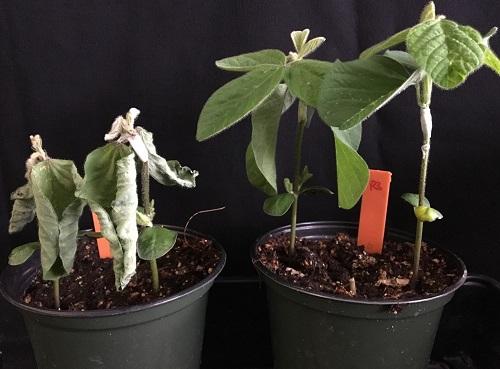New agbiotech startup company based on technology developed at the Boyce Thompson Institute is developing a novel seed treatment technology to protect plants against pests and pathogens

Credit: Aardra Kachroo, University of Kentucky
On January 29, 2019, Ascribe Bioscience became the first company based on technology developed at the Boyce Thompson Institute (BTI) to receive a Small Business Innovation Research (SBIR) grant. The agbiotech startup will use the $225,000 Phase I award from the National Science Foundation (NSF) to develop a seed treatment technology that protects plants from a broad range of pests and pathogens.
Located in Ithaca, NY, Ascribe was founded in 2017 by three BTI scientists, Frank Schroeder, Daniel Klessig and Murli Manohar, and a local entrepreneur, Jay Farmer.
Ascribe applies the tools of metabolomics to the soil microbiome to develop new products for agriculture. Metabolomics is an emerging field focused on the systematic study of small molecule metabolites produced by organisms. Ascribe’s platform for identifying new metabolites and their functions provides a powerful tool for discovering the mechanisms by which the soil microbiome affects crop health.
“There is great interest in leveraging the soil microbiome as a sustainable approach to improving crop health,” says Farmer, the company’s CEO. “Ascribe Bio’s approach of developing products based on the small molecules that mediate plant-microbiome interactions will provide farmers with solutions that are reliable, easy to use, and avoid the risks and complications associated with live microbe-based products.”
The company’s NSF grant is funding the commercialization of research from the labs of BTI faculty members Daniel Klessig and Frank Schroeder relating to ascarosides–a family of signaling molecules that are produced by microscopic worms called nematodes. Nematodes are part of the soil microbiome and communicate with each other using ascarosides as a chemical ‘language’.
“We wondered whether plants might have learned to perceive and interpret nematode signals, given that plant roots have been constantly exposed to parasitic nematodes and their excretions in the soil throughout their evolutionary history,” explains Klessig.
The researchers found that ascarosides induce plant defense responses and dramatically enhance their resistance against pathogens, even at extremely low concentrations.
“We discovered that plants perceive a nematode-specific chemical signature and then upregulate their immune systems in interesting ways,” says Schroeder. The plant’s immune response doesn’t get fully turned on, but it becomes “primed” to recognize pathogens more rapidly, he adds.
The results have now been validated for a range of agriculturally important pathogens that affect major crops, including rice, wheat, corn, soybeans, barley, tomatoes and potatoes.
“When you directly suppress a pest or pathogen, it creates selection pressure that causes resistant strains to emerge and flourish,” says Manohar, Ascribe’s CTO and Senior Research Associate at BTI. “Because ascarosides do not kill the pest or pathogen, we do not believe that development of resistance to these compounds will be an issue.”
These potential benefits will become increasingly important as climate change expands the range of many pests and pathogens, which are becoming increasingly resistant to chemical pesticides. Indeed, farmers use nearly 6 billion pounds of pesticide worldwide each year, but pests and pathogens still destroy an estimated 37% of crops.
The SBIR funds have enabled the company to hire three scientists to focus on formulation and production advances needed to launch a commercial product.
Ascribe is symbolic of BTI’s recent efforts to increase translation of scientific discoveries to real-world applications through the creation of new companies, says Paul Debbie, BTI’s Director of New Business Development and Translational Science.
“This NSF award is further evidence that BTI’s discovery research has tremendous potential to yield commercial products that could provide great benefits to society,” Debbie says.
“The National Science Foundation supports startups and small businesses with the most innovative, cutting-edge ideas that have the potential to become great commercial successes and make huge societal impacts,” said Graciela Narcho, Acting Director of Division of Industrial Innovation and Partnerships at NSF. “We hope that seed funding will spark solutions to some of the most important challenges of our time across all areas of science and technology.”
Klessig is also an adjunct professor in Cornell University’s School of Integrative Plant Science, and Schroeder is a professor in Cornell’s Department of Chemistry & Chemical Biology.
About the National Science Foundation’s Small Business Programs: America’s Seed Fund powered by NSF awards $200 million annually to startups and small businesses, transforming scientific discovery into products and services with commercial and societal impact. Startups working across almost all areas of science and technology can receive up to $1.5 million in non-dilutive funds to support research and development (R&D), helping de-risk technology for commercial success. America’s Seed Fund is congressionally mandated through the Small Business Innovation Research (SBIR) program. The NSF is an independent federal agency with a budget of about $7.8 billion that supports fundamental research and education across all fields of science and engineering.
###
Media Contact
AJ Bouchie
[email protected]
Original Source
https:/




